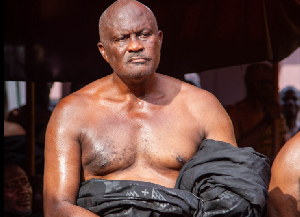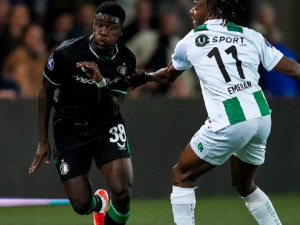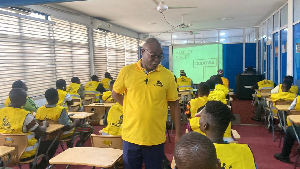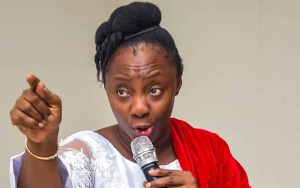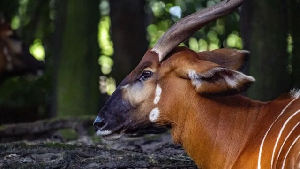The Germans were latecomers to the scramble for Africa. Even if there may have been individual Germans scouring the coasts of Africa (as slave traders?), it was only after the Berlin Conference of 1844-85 that Germany became an established colonial power in Africa. The conference (also known in German as Kongokonferenz or Westafrika-Konferenz) is said to have been initiated by Portugal in its dispute over colonies in the south western parts of Africa.
Perhaps the earliest German settlement in our part of Africa is a place called Gross-Fridrichsburg which is now in the southern part of the Western Region of Ghana. The Germans had control of this area between 1683 and 1717. But then this was a time when several European countries were coming and going on the coasts of Africa fighting each other in the process for control of trade.
On the eve of the Great War, the Germans had four colonies in Africa: Kamerun (consisting of parts of present day Central African Republic, Congo, Gabon, Nigeria and all of Cameroon), Deutsch Sudwestafrika (now Namibia), German East Africa (Deutsch Ostafrika) which was the biggest consisting of what are today parts of Burundi, Kenya, Mozambique (Ruvuna triangle), Rwanda, and all of Tanzania, and the smallest, Schutzgebiet Togo (Togoland Protectorate).
Then the war happened and the Germans lost all of these. First to go was Togo. It consisted of what is now all of Togo and the non-coastal eastern parts of Ghana formerly known as Trans-Volta Togoland (TVT). The garrison consisted of only 200 German soldiers and about 1000 native troops (known as Askaris). They were attacked by a much bigger joint Anglo-French expeditionary force from the Gold Coast and Dahomey. The outnumbered Germans could only fight delaying tactics but eventually surrendered on August 26, 1914. The fighting lasted only 18 days but it marked the beginning of the end of the German colonial enterprise in Africa.
The fight lasted longer in the other German colonies. Deutsch Sudwestafrika fell to the South Africans in 1915. Kamerun was lost in 1916. The longest struggle was for Deutsch Ostafrika. The fight here raged for years and did not end until 1919 – long after the war in Europe had ended. The interesting history of that fight is a whole chapter on its own.
The Anglo-French captors divided Togo between them. The French took about 60 per cent including all of the coastal areas. The British were satisfied with the rest which was less populated and less developed. I do not understand why the British settled for the smaller bit. Was it because they already had Gold Coast which was much bigger and also had the coastal areas including Denu, Aflao and Keta? Or were the British simply more interested only in dispossessing the Germans of their colonies (to show where power lies) than in acquiring more territories of which they already had a lot more around the world than the French? Was it not said that the sun never set on the British Empire?
The terms of the armistice that ended the First World War included the surrender of Germany’s possessions in Africa. At the Paris Conference of 1919, the British in particular, under PM Lloyd George (every bit as imperialist as his cabinet colleague, Winston Churchill) were determined to keep possession of the German territories they had taken over. The idea of the League of Nations (to prevent other wars) was mooted at this conference. It was agreed that the seized German territories would be administered under mandate of the League of Nations to which the administering authorities would report. The French kept their part of Togoland as a unit on its own and administered it as such. The British added their portion to the Gold Coast but observed the mandatory status of the new acquisition.
For all the negotiations in Paris, nobody asked the chiefs and peoples of the areas their opinion. With the Germans gone, they now found themselves answering to the call of another colonial master speaking a different language. Was this a traumatic experience for them? Maybe not. The history books tell us that some of the people in the area actually helped the French forces to kick out the Germans whom they did not quite like because of the way they (the Germans) treated them. The only positive aspect of the German presence was the missionaries who brought religion and education to the area. The Norddeutsche Mission, (“Bremen mission” or “Brematorwo”) started its activities in Keta in the 19th century and spread Christianity among the Ewes in Peki and Ho. They worked without the protection of the colonial power.
What was life like for the Africans under the Germans? On the occasion of Ghana’s Golden Jubilee, Dr. Peter Sebald (who has done a lot of historical work on the German colonial presence in Togo 1884 - 1914) posted an article on the website of the German embassy in Accra detailing German colonial activities in the area. The German administrators were brutal, no two ways about that. Their maltreatment of the Herero in South-West Africa was not an isolated case. They established their presence in the areas they occupied through force – killing, maiming and burning down villages. Sebald writes:
“… [T]he troop of German mercenaries called Polizeitruppe burned down the Towe-villages south of Kpalime. Likewise, Kpandu’s Volta harbour Nkabi was destroyed by German “punishment actions”. … Unlike the population in the separated villages of Southern Togo, the leaders of the Islam-influenced northern Kingdoms were able to organise a far more effective resistance against the Germans. To break their opposition and demonstrate military power, the Polizeitruppe set out in 1896 to burn down Bimbila and Yendi and dozens of other villages. On December 2, 1896, they defeated 4,000 Dagomba warriors near the village Adibo. About 500 dead bodies were counted on the battle field. Up to [to]day the Adibo dalí – the day of Adibo – is remembered among the Dagomba.”
There were public canings for the least offences. Despite all these maltreatment, the Germans did not develop the colony. Sebald again:
“A look at the German buildings in Togo can reveal much of the regime’s character. Twelve prisons but only four schools were built by the German Administration. In Western Togo, which today is part of Ghana, the Germans built not even one school but four prisons. … Only a 59 km-long junction road from Assahun to Ho and the 50 km route across the mountains from Kpalimé to Kpandu were constructed.”
All colonialism was bad for the colonial subjects. But was British colonialism less brutal than the others? All of them clothed their enterprises as humanitarian and civilizing ventures. Behind the beautiful slogans (the French “mission civililsatrice” and Kippling’s White Man’s Burden – Send forth the best ye breed) were brutalities of all kinds.
Then came the Plebiscite of 1956. It was ordered by the UN which had taken over the mandated territories from the defunct League of Nations. The plebiscite was a very controversial affair. The side that did not want TVT to become an integral part of the Gold Coast protested vehemently against the results alleging that they were rigged. They even blamed the colonial government for allowing Nkrumah and Gbedemah to campaign for a Yes vote in the area when neither of them was a citizen of the TVT and, thus, not eligible to vote on the issue. You would think complaints about the outcomes of elections in our country started yesterday. But the “No” people failed to overturn the results. The British half of the former German colony of Togoland became a bona fide British possession, at least until the time the Gold Coast became independent. The plebiscite was held on May 9, 1956. On December 13, 1956 the unification was formally put into effect and TVT ceased to exist. The Anschluss had been consummated. All the citizens of TVT became Gold Coasters for the three months leading to our independence on March 6, 1957 when everyone became Ghanaian.
The CPP government quickly put the axe to the erstwhile TVT splitting it into two. The Ho, Kpandu and Buem/Krachi Districts of the TVT were added to the Anlo and Tongu Local Government areas of the Gold Coast to form the new Volta Region. The rest of TVT, made up of the Gonja, Mamprusi and Dagomba Districts, were added to the Northern Protectorate of the Gold Coast to form the Northern Region. The reader should note here that the Volta Region is NOT coterminous with the erstwhile TVT.
The rest of this piece is an attempt at a counterfactual narrative of what would have happened if the First World War had not taken place. Without this war, the Second World War probably may probably not have happened either (historians are divided on this issue). The Germans would certainly have kept their colonies in Africa. What, then, would the situation have been in our part of the world?
Would the Germans have followed the trend in the late 50s and early 60s to grant independence to their colonies in Africa? Or would they have done that before the British and the French – their arch rivals?
Ghana’s land area would be smaller than it is now. It would be without much of the present Volta Region and parts of Northern and Upper East regions that had belonged to the Germans. Ghana’s present area would have been less by 33,775 square kilometres which was the area of the TVT. This is not huge but it is slightly bigger than Belgium and also bigger than the US State of Maryland. It is a lot bigger than the Gambia, Cape Verde, Lesotho, Rwanda, Burundi, Equatorial Guinea, Swaziland and the Seychelles.
The Volta River would not have been an entirely Ghanaian possession. The River would have marked part of the eastern border of Ghana. It would probably have been difficult to construct the Akosombo Dam. Much of the artificial lake produced by the construction of the dam and the people displaced by it would have been in a country different than Ghana.
The colonial powers used latitudes to demarcate the borders between them without any concern for the conglomeration of ethnic groups in the areas they were sharing. Had the Germans stayed, the Ewes of Keta, Anloga, Denu, Tongu, Peki, Awudome, etc. would have remained Gold Coasters and gone on to be part of Ghana. The Ewe minority in Ghana would have been smaller than it is now as it would not have included the Ewes of Ho, Kpandu, or Hohoe. Kadjebi, Kete Krachi, Nkwanta, Yendi, and beyond would not have been part of Ghana.
The Gonjas, Bimbilas and some smaller ethnic groups in the north would have been divided in two countries. The Kokomba-Nanumba conflict would have taken a different nature. The Akan speaking areas of the present day Volta Region would have belonged to a different country than the one occupied by the bulk of Akans (Ghana). Worawora, Kadjebi, Asato, Jasikan were all parts of TVT.
The former German colony of Togo would have had German as its official language. Students in this country would have had to study French and English as foreign languages just as, we now study French in Ghana as a foreign language. German philosophy and literature would have been stressed in the schools of this former German colony. Instead of Hume, Locke, Rousseau or Voltaire, more attention would have been paid to Hegel, Schopenhauer, Kant or Nietzsche. Instead of Thomas Mann’s Death in Venice, students would have read Der Tod in Venedig in the language of the original. And for Kafka’s Metamorphosis, they would read Die Verwandlung. Wagner’s wonderful music will be better known than just that famous tune from Die Walkure which everybody knows (you know it – it’s the one that opens Coppola’s Apocalypse Now, 1979).
With so many former German African colonies that are now members of the African Union, German would certainly have become one of the official languages of that organisation. But when we say Anglophone, Francophone and Lusophone, what would we call the African countries that use German as their official language? In nearby Ghana, German would have been one of the languages studied at O Levels or WASSCE and a popular one at the Languages departments of the universities.
Would the vaunted German work ethic have been instilled into the people of this country? And would the Bundesliga be more popular in this country than the English Premier League?
For a long time, Ghanaians did not need visas to enter West Germany. This was a privilege that Togolese enjoyed long after it was stopped for Ghanaians. But Germany’s Willkommenskultur had really been extended to everybody perhaps as expiation for her Nazi past. There is a Professorial Chair in Ewe at the University of Cologne’s Institute of African studies. Ghana has always enjoyed very good relations with Germany over the years. I don’t think this is due to any special ties based on its colonial relationship with part of our country. Today, most of the Ghanaians you will see on the streets of German cities are Akan speakers rather than Ewes or Gonjas.
I was born in Trans-Volta Togoland. My mother may have strapped me behind her back as she went to cast her vote in the plebiscite. I was a Gold Coaster for only three months. My parents were baptised by Dutch missionaries into the Catholic Church. But my mother’s parents were baptised by German Catholic missionaries. Her father was christened Ferdinand – yes, like the Archduke Franz Ferdinand, heir apparent to the Austro-Hungarian throne, whose assassination in Sarajevo eventually triggered the First World War which led to the German loss of her colonies worldwide. My grandmother also had a German Christian name. She was called Vaibrugah. And so I come to Europe in the early 1980s and meet some Germans on the Erasmus student exchange programme. I proudly tell them of my grandmother’s name (actually spelled Walburga) and they tell me it was an ancient German one that no one takes any more.
Growing up in the early 60s Ghana, I would look at the exercise books of my uncles and aunties who had started school before our independence. There was the map of the Gold Coast at the back as well as that of TVT shown as a separate entity from the Gold Coast. Nobody could make the mistake that TVT was part of the Gold Coast! After independence the map at the back of the new exercise books now showed a full map of Ghana without the TVT borders. Vehicles registered in the territory had TVT in their registration numbers. After independence, these were removed and new registrations issued. TVT was truly dead!
I have wondered what really drove my parents and grandparents to insist on a No vote in 1956. The formulation on the ballot paper was not clear-cut. The No only meant that TVT would not become part of the Gold Coast. It did not say what would be done to the territory. The predominantly No vote in the Ewe districts of the TVT meant they would be cutting themselves off from their fellow tribesmen and co-religionists in the Gold Coast. The links between the Gold Coast Ewes and the TVT Ewes were strong. The Roman Catholic and the Bremen Protestant missionaries had organised their churches to incorporate the entire Ewe-speaking area. They had established schools that run on similar lines. It was German missionaries who first wrote down the language, translated the Bible into Ewe and produced the first Ewe lexicon. Indeed, they imposed one Ewe grammar and orthography on all Ewe dialects of which there are hundreds. This is why in the GCE or WASSCE, there is only one Ewe paper as compared to Akuapem, Asante and Fante. Today, when the mid-Volta Ewes say “tso le futa va do ‘weme” they mean all the Ewe people from the coast to the northernmost Ewe outpost. If it was the desire to see all Ewes from Gold Coast through Togoland to the borders of Nigeria united in one country, then it was as improbable as Nkrumah’s doomed attempt to unite all of Africa.
German Togoland existed for only some 25 brutal years. At the time of the plebiscite, the German administrators had been gone for more than 40 years. It was only the work of the early German missionaries that could be remembered with any nostalgia. The Togolese were now speaking French whereas our grandfathers had been taught English.
The question of the plebiscite was a very passionate one for my parents’ generation. There was some effusion of blood over the issue. I grew up not knowing some of my uncles who had run away on self-imposed exile in Togo. They did not return until after the 1966 coup. They were stalwarts of the Togoland Congress (I guess the term “foot soldiers” was not then used) dead set against the unification of TVT with the Gold Coast, and when their side lost and the troubles started in Alavanyo, they disappeared. Today, the elderly in my village who recount these stories will tell you sometimes no one was really after some of these runaways and that petty jealousies were responsible for some of the flights. Someone may be running after another person’s wife and would spread rumours that the Nkrumah police were after them and the cuckolded husband would vamoose. Local chieftaincy disputes were also preyed on to frighten others. Oh, my uncles returned with the new wives and children they had acquired in their time of exile.
It is difficult to understand the cravings for secession or special status of some descendants of former Trans-Volta Togolanders. The passions are still hot and kept alive by some people who were not even born when the plebiscite happened. There is the story that the British had promised a review after 50 years. Prof D. E. K. Amenumey, who has written a lot on these things, maintains there was absolutely no such promise. The documents from the 1950s that I have also seen say no such thing. If the craving is based on ties to Germany, there is nobody today who remembers the German times. Besides, the northern parts of TVT voted to join Gold Coast even with allowance made for rigged votes. These people are not Ewes and do not have the Ewe spirit of ethnic belongingness. They are the ones now crying for a separate region just so they can cut themselves off from the Ewes. The new government has promised them a new region. It appears the Ewes do not like this. Many Ewes migrated to these areas a long time ago and had made their homes there. The issue will be decided by a referendum. Nobody knows what form that will take.
I wish to end this article by imagining a parallel universe in which the Archduke’s car had a reverse gear and the chauffeur could easily turn around making it impossible for Gavrilo Princip to pull that fatal trigger. The Great War never happened. The German Chancellor, Angela Merkel, is visiting the former German colonies (now all independent) in Africa. There are huge historical, cultural and economic ties between the metropolitan country and its former colonies. Merkel flies first to Dodoma. Her next stop is in Windhoek from where she flies to Douala in Kamerun (which is bigger than it is now since it includes parts of Nigeria). Her last stop is the smallest of the former German possessions – Togo. It is dear to Merkel’s heart because she says her grandfather was a colonial administrator in the area. From Lomé, she visits some of the districts and arrives in Ho where her grandfather had been stationed. She is met at the airport by school children waving miniature German and Togo flags. At the stadium in Ho, she addresses a large crowd of the chiefs and people in the area. Before her speech a choral group from the Ho Evangelical Church sings the German national anthem. The two World Wars never happened so it is “Deutschland Deutschland uber alles…” the preferred version. Then they sing the Togo anthem – also in German. Merkel’s address is in German. The local radio and TV stations carry the address live to the citizens of the country. No translations are needed. Everybody speaks German.
In such an alternative universe, I, Kofi Amenyo, born when TVT was TVT, am also speaking Deutsch. Oh, but I also learned die englische Sprache too, which I speak with a sing-song German accent…
(Full list of references available on request)
Kofi Amenyo (kofi.amenyo@yahoo.com)
Opinions of Monday, 6 March 2017
Columnist: Amenyo, Kofi







